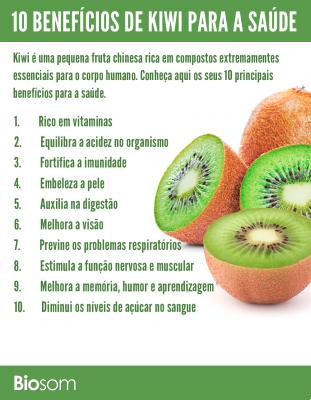
Kiwi (or Actinidia) is the commercial name of the fruit of Actinidia chinensis, a climbing shrub of the family of Actinidiacee.
Kiwi is made up of 80% of water, the 11% of sugar (fructose) and contains minimal amounts of fat and protein.
The kiwifruit pulp contains a high amount of vitamin C, superior to that of common citrus fruits: in 100 g of edible part there are from 70 to 85 mg; the daily requirement of vitamin C of an adult is about 60 mg, therefore one fruit is sufficient to cover this need.
In kiwifruit there are good concentrations of Vitamin E and other caritenoids e flavonoids, active against the action of free radicals.
It also provides folic acid, an essential vitamin for a good performance of brain functions.
Kiwi is particularly rich in potassium (320 mg in 100 g of pulp), essential for a normal activity of the nervous and muscular system, and prevents the onset of arterial hypertension; also contains magnesium, football, chlorine, sulfur e phosphorus.
The pulp and seeds are rich in fibers, which help regulate intestinal activity and also reduce the absorption of refined fats, cholesterol and sugars.
Contains numerous enzymes, including actinidin, which aids in the digestion of protein-rich foods.
Therapeutically, kiwifruit is useful for:
- promote healing in case of flu and viral diseases, because it increases the immune system;
- maintain a good state of health of the skin and mucous membranes;
- increase the strength of the walls of capillaries, improving blood circulation;
- regulate blood pressure;
- reduce cholesterol, fat and blood sugar levels;
- prevent and treat constipation.
For an effective intestinal regulation action, the consumption of a ripe kiwi in the morning before breakfast is recommended.
To make the most of the properties of this fruit, eat two or three fresh kiwis after a meal or as a snack; or you can consume the centrifuged juice, also leaving the peel (well cleaned and brushed), to increase the enzyme content of the drink.


























